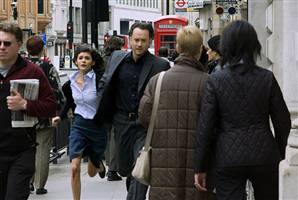
Ansa.it
Agenzia Nazionale Stampa Associata
January 31, 2006
Catholic group says bestseller has upped its profile (ANSA) - Rome, January 31 - Opus Dei, the conservative Catholic organisation, says it may eventually benefit from being depicted in spine-chilling terms in Dan Brown's bestseller The Da Vinci Code .
In the hugely popular thriller, a film of which is due out in May, a creepy Opus Dei monk is ordered by his masters to commit murder so that ancient 'truths' about the Christian faith will not be revealed .
Although the organisation wrote a letter of protest to the novel's publisher after its release in 2003, it has not started legal action and appears unwilling to do so, partly so as to avoid feeding controversy. Instead, it is starting to think that The Da Vinci Code - with its thrilling story about a supposed 2,000-year cover-up by the Catholic Church - may even be a blessing in disguise. "Since the book came out, over a million people in the United States alone have contacted our website," said Manuel Sanchez, a press officer at Opus Dei's Rome headquarters. "We have received thousands of messages from people who wanted fuller information on the Catholic Church and Opus Dei." Until recently Opus Dei - which claims to have 84,000 members in five continents - was not very well known in the United States. Now, partly thanks to Dan Brown's fictional work, many more people have at least heard of it .
A film of The Da Vinci Code, starring Tom Hanks and Audrey Tautou, is to be released by Sony Pictures in May and will presumably make Opus Dei known to even more people .
Sanchez said the visibility has given his organisation a chance to explain what Opus Dei really is. "The fictional work is becoming a channel through which to discover the reality," he added. This reality, he said, was "ordinary Christians who love their families and their work, people who want to serve God and others without leaving the world behind." Opus Dei has worked hard over the years to free itself of the suspicion that has traditionally surrounded it in Europe. Founded in Spain in 1928, it has in the past been accused of secrecy, conservative beliefs, a right-wing political agenda and even cult-like methods .
At the front of his book, Dan Brown included the following definition of Opus Dei: "a deeply devout Catholic sect that has been the topic of recent controversy due to reports of brainwashing, coercion and a dangerous practice known as 'corporal mortification.'" Opus Dei rejects all that, as it also dismisses the book's central idea that Jesus Christ was married and had descendants, and that the Church covered this up in order to preserve male dominance in society .
While this does not look like an advert for the Catholic Church, Sanchez noted that if people read the book or watch the coming film, they will at least be thinking about the figure at the centre of Christianity .
"Talking about Christ is always a good thing, even if it is distressing when he is talked about without respect. In a certain sense, the success of the novel confirms that the figure of Jesus Christ is attractive." He declined to say how Opus Dei might react to the release of the film, saying it depended in part on what it was like. José Maria Escriva de Balaguer, who founded the movement in 1928, was canonised in 2002 by John Paul II. The act set the seal on the Catholic Church's full acceptance of a movement which it had initially distrusted .
It is often said to be a highly influential organisation which has members in top positions both in the Catholic Church and in secular society. Its members say reports of its influence are exaggerated .
© Copyright ANSA. All rights reserved
2006-01-31 18:00

No comments:
Post a Comment